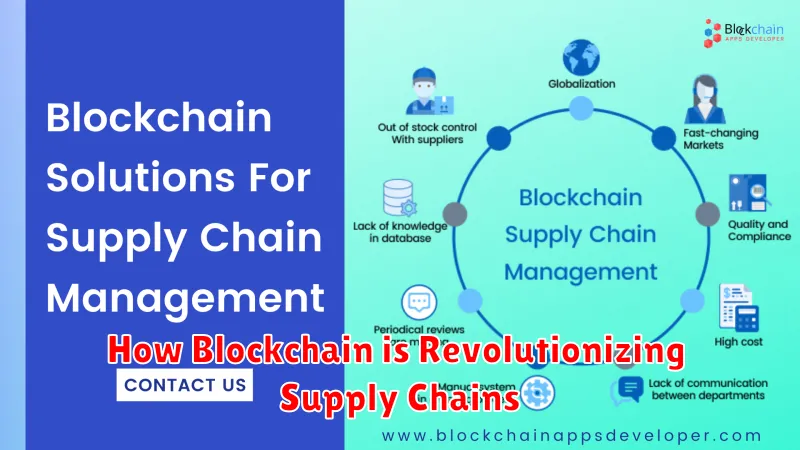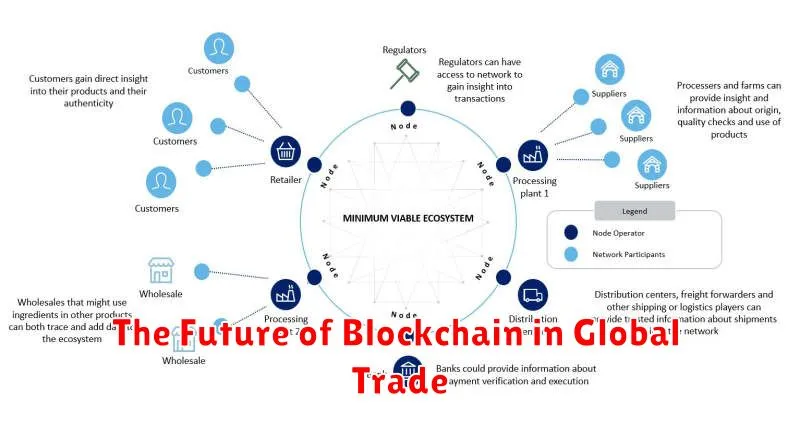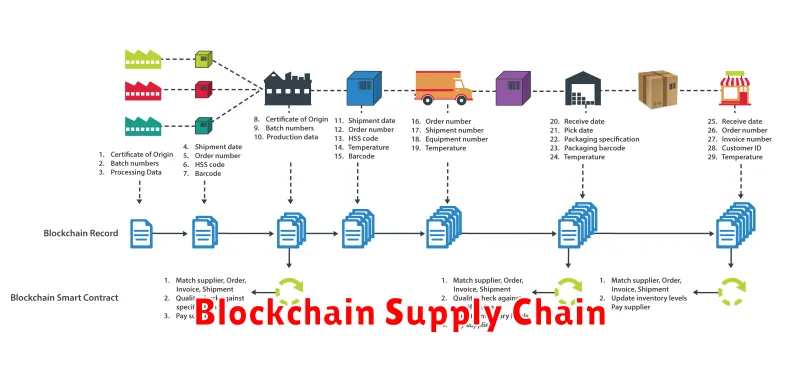In today’s dynamic and interconnected business landscape, ensuring transparency, efficiency, and security in supply chains is paramount. The rise of blockchain technology has revolutionized various industries, and supply chain management is no exception. Blockchain’s decentralized, immutable, and transparent nature offers a compelling solution to the longstanding challenges faced by supply chain stakeholders.
This article delves into the role of blockchain in supply chain management, exploring its potential to enhance traceability, visibility, and trust. From tracking product origins to facilitating secure transactions, we will examine how blockchain can transform traditional supply chain processes and pave the way for greater efficiency, cost savings, and improved customer satisfaction.
How Blockchain is Revolutionizing Supply Chains

Blockchain technology is transforming supply chain management by offering a secure, transparent, and efficient way to track goods and manage information. This revolutionary technology enables real-time visibility throughout the supply chain, from raw materials to finished products.
Transparency: Blockchain creates an immutable and transparent record of all transactions, eliminating the need for intermediaries and increasing trust among stakeholders. Each transaction is recorded on the blockchain, making it readily accessible to all authorized parties.
Traceability: Blockchain allows for end-to-end traceability of products, enabling companies to track their journey from origin to final destination. This capability facilitates product recall management, provenance verification, and fraud prevention.
Efficiency: By streamlining data sharing and eliminating manual processes, blockchain streamlines operations and reduces costs. Automated processes enhance efficiency, reduce paperwork, and improve communication among supply chain participants.
Security: Blockchain’s decentralized nature and cryptographic encryption ensure data integrity and security. This mitigates the risk of data breaches, tampering, and counterfeit products.
In conclusion, blockchain is revolutionizing supply chains by fostering transparency, traceability, efficiency, and security. Its transformative potential enables businesses to optimize operations, build trust, and enhance customer satisfaction.
The Benefits of Blockchain for Transparency and Security
Blockchain technology has emerged as a transformative force in various industries, including supply chain management. Its decentralized and immutable nature provides numerous benefits for enhancing transparency and security throughout the supply chain. Transparency is a key advantage of blockchain, as it allows all stakeholders to access a shared and verifiable record of transactions and product movements. This eliminates the need for intermediaries and reduces the risk of fraud or manipulation. By recording information on a distributed ledger, blockchain ensures the integrity and authenticity of data, preventing tampering or alteration.
Security is another crucial aspect where blockchain excels. The decentralized nature of blockchain makes it highly resistant to hacking or data breaches. Since data is distributed across multiple nodes, it becomes extremely difficult for a single entity to compromise the entire system. Additionally, the cryptographic algorithms used in blockchain ensure the confidentiality and integrity of data. This robust security framework safeguards sensitive information and protects against unauthorized access.
In summary, blockchain offers significant advantages for enhancing transparency and security in supply chain management. Its ability to provide a shared, immutable, and secure record of transactions empowers businesses to track products, verify authenticity, and build trust with their stakeholders. By leveraging blockchain’s transformative potential, organizations can streamline their operations, mitigate risks, and create a more efficient and reliable supply chain ecosystem.
Challenges in Implementing Blockchain in Supply Chains
While blockchain offers significant potential to revolutionize supply chain management, its implementation faces several challenges.
One of the primary hurdles is the lack of industry-wide standards. Different blockchain platforms and implementations can create incompatibility issues, making interoperability difficult. This fragmentation hinders the seamless flow of information and data sharing across the supply chain.
Another challenge is cost and complexity. Implementing blockchain requires significant upfront investment in technology, infrastructure, and skilled personnel. This can be a barrier for small and medium-sized enterprises (SMEs) who may lack the resources to adopt this technology.
Furthermore, scalability remains a concern. Blockchain technology can handle a limited number of transactions per second, making it challenging to manage large-scale supply chains with numerous participants and high transaction volumes.
Security is another crucial aspect. While blockchain is known for its secure nature, there are still vulnerabilities that need to be addressed. Malicious actors could exploit these weaknesses, compromising the integrity of data and disrupting the supply chain.
Finally, regulatory uncertainty presents a significant challenge. The legal and regulatory landscape surrounding blockchain is still evolving, creating ambiguity for businesses navigating compliance issues.
Despite these challenges, the potential benefits of blockchain in supply chain management are undeniable. With continued research, development, and collaboration, these obstacles can be overcome, paving the way for a more efficient, transparent, and secure supply chain ecosystem.
The Future of Blockchain in Global Trade

The advent of blockchain technology has brought about a revolution in various sectors, and its impact on global trade is particularly noteworthy. Blockchain’s inherent transparency, security, and immutability make it an ideal tool for streamlining and enhancing supply chain management. As we move forward, the future of blockchain in global trade holds immense promise.
One of the key areas where blockchain can transform global trade is through supply chain transparency. With blockchain, all transactions and data related to a product’s journey can be recorded and tracked immutably, providing real-time visibility to all stakeholders. This enhanced transparency can significantly reduce the risk of fraud, counterfeit products, and inefficiencies in the supply chain.
Another significant aspect is trade finance. Blockchain can streamline and automate financial processes, reducing the need for intermediaries and paperwork. This can lead to faster and more efficient trade financing, benefiting both exporters and importers. Furthermore, blockchain can facilitate secure cross-border payments, minimizing the risk of fraud and delays.
The future of blockchain in global trade also lies in smart contracts. These self-executing contracts can automate trade processes, such as customs clearance and payments. Smart contracts can significantly reduce paperwork, improve efficiency, and minimize human error.
While blockchain holds immense potential, challenges such as scalability, regulatory uncertainty, and lack of widespread adoption need to be addressed. However, with ongoing technological advancements and collaboration among stakeholders, blockchain is poised to reshape global trade and unlock significant opportunities for businesses worldwide.
Case Studies: Successful Blockchain Supply Chain Solutions
Blockchain technology is transforming supply chain management by offering transparency, security, and efficiency. Here are some successful case studies showcasing the impact of blockchain solutions:
Walmart: Walmart implemented a blockchain-based system to track the origin of its leafy greens. This platform allows for real-time tracking of produce from farm to store, reducing food safety risks and improving traceability.
Maersk: The shipping giant partnered with IBM to create a blockchain platform called TradeLens. This platform enables secure sharing of shipping documents and data among stakeholders, streamlining the entire supply chain process and reducing delays.
Provenance: This platform helps brands track the origin and journey of their products, enhancing transparency and building consumer trust. For instance, a coffee company uses Provenance to share information about its ethical sourcing practices and the journey of its beans from farm to cup.
De Beers: The diamond giant utilizes a blockchain platform to track diamonds from mine to retail, ensuring authenticity and preventing illegal diamond trade. This system provides proof of origin and ensures ethical sourcing practices.
These case studies demonstrate the transformative potential of blockchain in supply chain management. By leveraging this technology, businesses can enhance transparency, improve security, and optimize efficiency throughout the supply chain, ultimately leading to improved operations and greater customer satisfaction.
Real-World Applications of Blockchain in Logistics
Blockchain technology is rapidly transforming the logistics industry, offering innovative solutions for enhancing transparency, efficiency, and security. Here are some real-world applications of blockchain in logistics:
Track & Trace: Blockchain enables real-time tracking of goods throughout the supply chain, providing accurate and immutable records. This allows businesses to monitor shipments, identify delays, and ensure product authenticity.
Supply Chain Financing: Blockchain facilitates secure and transparent financing solutions. By recording transactions on a distributed ledger, it enables faster and more efficient payments between parties involved in the supply chain.
Smart Contracts: Blockchain enables the automation of contracts and agreements, eliminating the need for manual paperwork and reducing the risk of errors. This streamlines processes and optimizes efficiency.
Inventory Management: Blockchain provides a shared, secure platform for managing inventory data. This allows for real-time visibility into stock levels, reduces waste, and improves overall supply chain coordination.
Food Safety: Blockchain can be used to track the origin and provenance of food products, ensuring food safety and traceability. This helps to prevent fraud and build consumer trust.
Pharmaceutical Logistics: Blockchain can enhance the security and integrity of pharmaceutical supply chains, ensuring the authenticity and safety of drugs. This is crucial for preventing counterfeit medications and protecting patient health.

